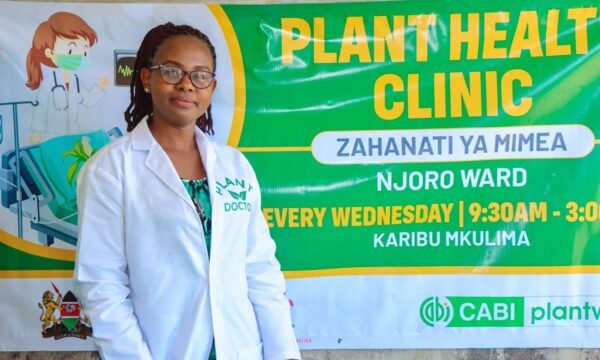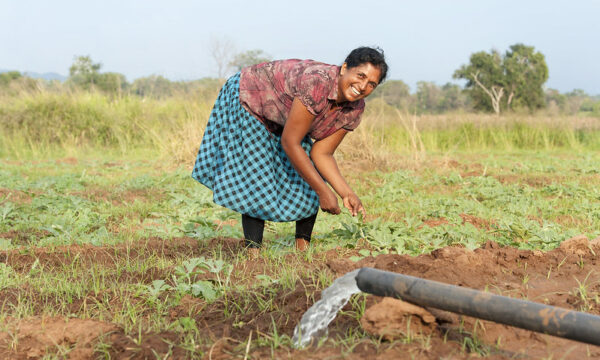
Plant doctor showing a specimen through a USB microscope in Balkheda plant clinic. Photo courtesy: MSSRF
The emergence of Information and Communication Technologies (ICT) in the last decade has opened new avenues in knowledge management that could play important roles in meeting the prevailing challenges related to sharing, exchanging and disseminating knowledge and technologies. The types of ICT-enabled services are capable of improving the capacity and livelihoods of poor smallholders are growing quickly.
One of the best examples of these services is the use of mobile phones as a platform for exchanging information through short messaging services (SMS), use of broadband services and other android applications.
According to a report of Swedish mobile network equipment maker Ericsson, India is the world’s second-largest telecommunications market, with 933 million subscribers and the subscriptions are adding year by year. The growing market of mobile phones in the country is due to the falling cost of handsets which is coupled with improved usability and increasing network coverage.
Why ICT for rural development?
PC’s, laptops, Internet, television, radio, and traditional newspapers have been used to promote improved rural development.Mobile phones have emerged as a new ICT tools and is currently exploited in agricultural rural development for disseminating relevant and timely information to the smallholders. A mobile application is defined as a piece of software on a portable device (such as a mobile phone handset, personal digital assistant, or tablet computer) that enables a user to carry out one or more specific tasks that are not directly related to the operation of the device itself. It facilitates sustained and equitable penetration of information and knowledge among households, reducing their vulnerabilities in agriculture and maximizing economic benefit.
Plantwise Interventions harnessing ICT in plant clinic: Plant clinics in India are run in collaboration with MS Swaminathan Research Foundation (MSSRF), in Tamil Nadu, Maharashtra and Puducherry and with Self Employed Women Education (SEWA) in Gujarat to offer precise, diagnostic and advisory services for plant diseases and helping create durable plant health systems, and food safety for smallholder farmers in their areas.
Further to this, Plantwise in India has been continually improving the existing services they offer as new technologies are emerging.
USB computer microscope: The plant doctors in the plant clinics are using USB computer microscope which is also known as a computer microscope or a computer-connected microscope. Using CMOS sensors this hand-held microscope can be plugged into a USB port on a computer or television. Instead of looking through an eyepiece, the viewer then examines the specimen via the computer’s monitor or the television screen. It’s essentially a webcam with a macro lens. The USB computer microscope’s lens can touch an object to see it magnified or can be used to view objects at a short distance. The images can easily be saved as pictures files or video films, printed and sent to experts. Plant doctors are seen to exploit the technology when they are unable to diagnose the problem they click the pictures and videos and share among the other plant doctors and experts.
These microscopes although are very helpful for plant doctors but were also found to attract more farmers and increase the plant clinics attendance says Vijay Thokre, Agricultural Scientist MSSRF at Balkheda plant clinic in Maharashtra. He added that it is very helpful in field diagnostics and is portable when they have to travel for conducting plant clinics. It is helpful in developing trust among farmers of the advices being given.
A plant doctor in Thanjavur, Tamil Nadu, Sudhakar shares that they click images and videos of sample and can also share for some unidentified samples with experts. These microscopes have increased the diagnostic ability of plant doctors.
Offline Knowledge Bank: Plantwise Knowledge Bank is adding to plant doctor’s knowledge as an offline tool in USB devices. The region specific technical and farmers’ factsheets can be viewed by plant doctors in the plant clinics to update their knowledge on pests/diseases. An added advantage of this offline application is that it can be carried and used without any internet connection and can be updated whenever required.
Plantwise Factsheet Library: Factsheet Library app has enabled plant doctors to take open access data with them to the plant clinics and field. The advantages of this application is that it can be downloaded in any mobile application for free from the play store and any country can be chosen for viewing the factsheets relevant to that particular country. The app will periodically check the servers for updates to factsheets.
Data collection app: Recently use of data collection app via use of tablets has also been tested in a plant clinic in Thanjavur, Tamil Nadu to collect data and it was found to be working well in tamil script. The farmers were happy to receive the recommendations through SMS in their local language. Most of the basic phones with farmers viz Nokia and Samsung were found to support the tamil script while phones like LAVA and Micromax were not supporting the script. But still the majority of the phones with farmers were supporting. The farmers sent the recommendations SMS directly to the agro-dealers to confirm the availability of the pesticides recommended. With the overwhelming feedback from the farmers there are plans this year to investigate further the usage of mobile technology in India.
All these ICT interventions in plant clinics in India are helping farmers to receive locale-specific, timely and effectual information, knowledge and skill inputs.
Related News & Blogs
How plant clinics are strengthening crop health services in Bangladesh
When the first-ever plant clinic in Bangladesh opened in Dhaka in 2013, it initially faced a lack of interest due to its novelty and limited awareness among farmers. However, it went on to expand, providing advice to over 17,000 farmers and led to the…
2 July 2025




